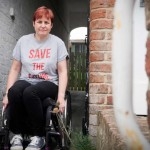
UN told, One in five Britons with disabilities have their rights violated
Half of disabled people in the UK feel excluded from society and believe they are suffering erosion of their rights because they are disabled, the government-backed Equality and Human Rights Commission has said in a damning report to the United Nations.
The body cites "deeply concerning" evidence that despite government pledges to improve conditions for the nearly 14 million disabled Britons, their situation is getting worse across the UK.
Its report to the UN committee on disability rights that "more and more disabled people are finding it difficult to live independently and be included, and participate, in their communities on an equal basis".
More people with disabilities have been bullied at school and continue to live in poverty than non-disabled people. According to research by Scope, Forty per cent of disabled people do not feel valued by society, half feel excluded and only 42% feel the UK is a good place for disabled people to live.
The government responded that it was "committed to building a society which is fully inclusive of disabled people" and that ministers were grasping the problems. The findings have been backed by disabled people and campaign groups who said "we are slipping back to darker times".
Disability is defined under the 2010 Equality Actas a "physical or mental impairment that has a substantial and long-term negative effect on your ability to do normal daily activities". Almost half of all people of pensionable age in the UK are disabled, as are one in five working-age adults.
Scope estimates that disabled people spend £570 a month more the average Briton, but the EHRC says they are harder hit by welfare reforms, experience increasing barriers to finding work and are paid less when they do find work.
Kamran Mallick, the chief executive of Disability Rights UK, said: "Any progress made through government initiatives is immediately counterbalanced by a swathe of cuts elsewhere. Help with employment is of little use if people are unable to get to work because their mobility benefits have been taken away."
Last year the UN criticised the UK's "laws, regulations and practices that discriminate against persons with disabilities" and complained that not enough was being done to protect them from the negative affects of Brexit. Many grassroots projects are EU-funded.
"A year on, we have sadly seen little action or commitment to address the UN's recommendations," said David Isaac, the chairman of the EHRC. "Changes to our social security system and health and social care budgets make disabled people feel like second-class citizens and their rights to live independently have been impacted. Everyone has the right to an adequate standard of living and the rights of disabled people must be made a priority if we are to have a fair and equal society."
The government has set a target of getting a million more disabled people into work by 2027, but has been criticised for cutting welfare payments that it argues are holding some back from re-entering the workforce.
Half of the UK's disabled people work and the number is slowly increasing, but that compares to 81% of the non-disabled population.
Anna Bird, the executive director of policy and research at Scope, said: "It's a glaring injustice that half of disabled people feel excluded from our society. From poor attitudes to lack of focus from government, and from being overlooked in the workplace to being humiliated on public transport, life for many disabled people is still much tougher than it needs to be. It's time that changed."
In response to the EHRC's report, the government said it had made significant progress, but admitted "there is always more we can do".
"We're committed to building a society which is fully inclusive of disabled people across every area of their lives, from transport and housing to healthcare and employment," a spokesperson said.
"Our response to the UN sets out our progress over the last year, including the creation of a new inter-ministerial group on disability and society, which will drive progress against the implementation of the UN convention."
If you require specialist legal advice contact the team on 0203 206 1133
Broadgate Legal
London
Get in touch
with your query or requirements
London Solicitors
As a law firm we are dedicated to the needs of our private and corporate clients.
At the same time we recognise the needs of the wider legal community and are able to work with consultants across a range of disciplines.
Please call to discuss you legal needs, today.
Contact
Longcroft House,
2/8 Victoria Avenue,
London,
EC2M 4NS
0203 206 1133
2/8 Victoria Avenue,
London,
EC2M 4NS
0203 206 1133






